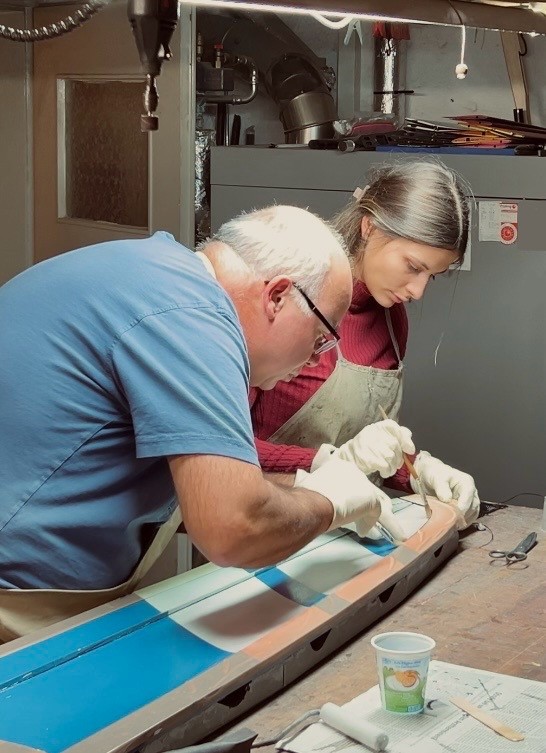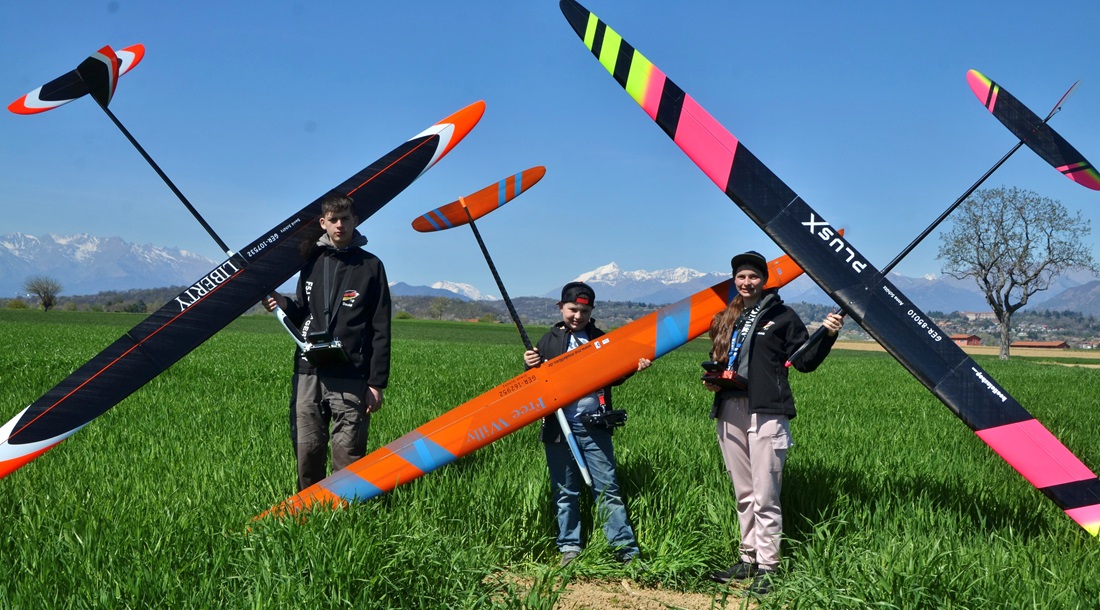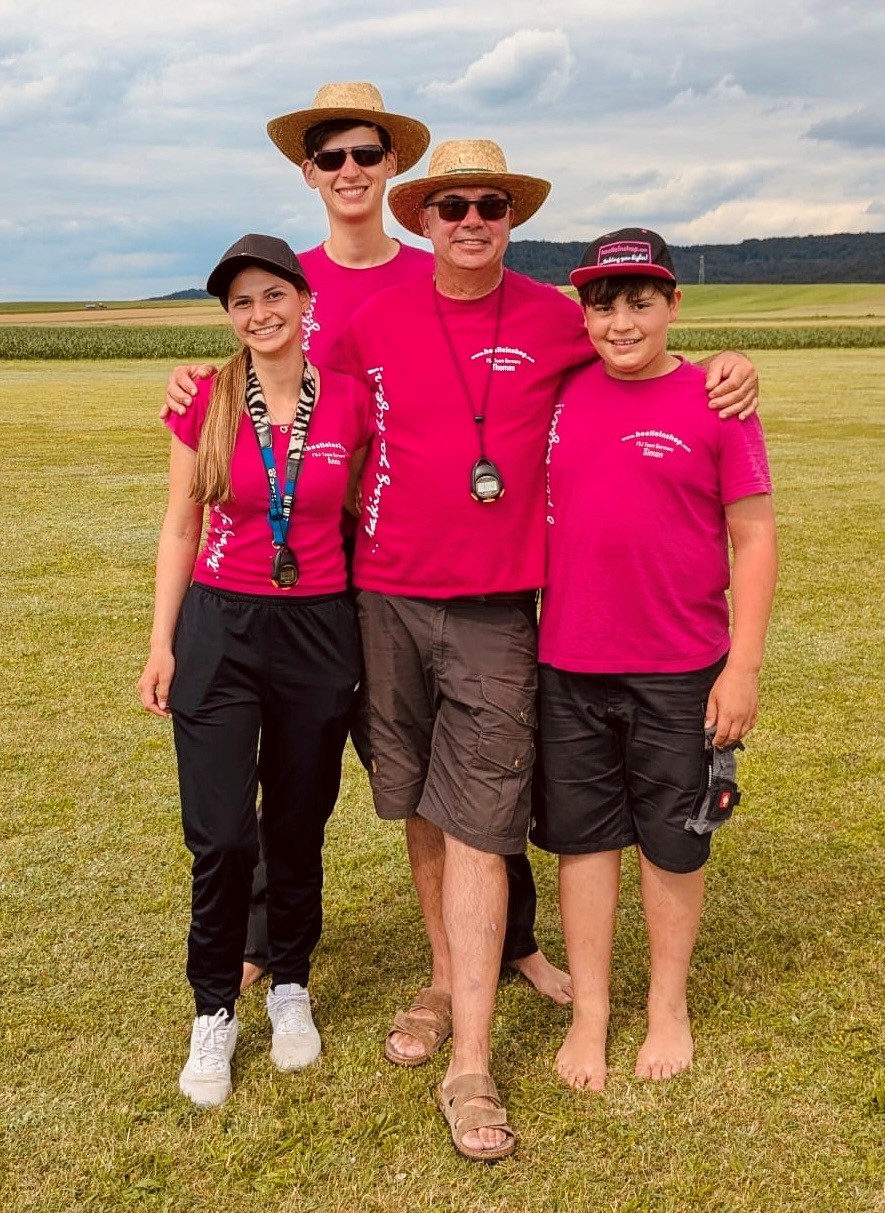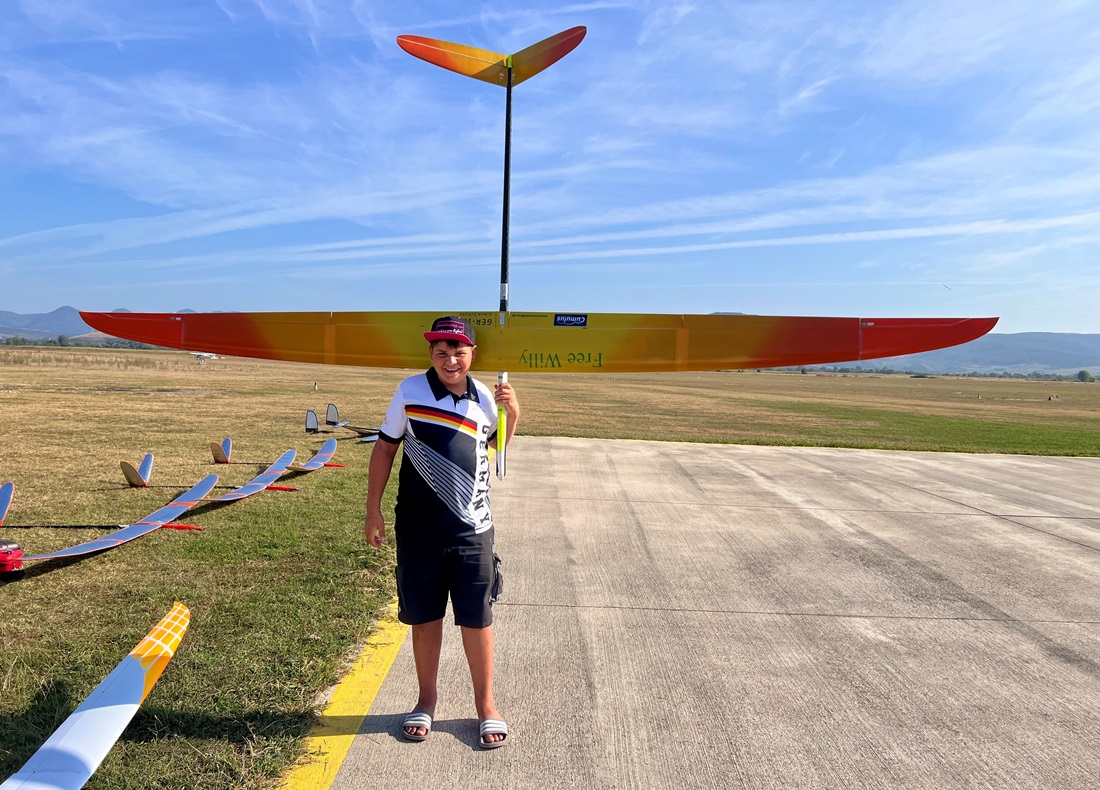A family tradition: Meet the Schutz family of F5J aeromodellers
When an eight-year-old Thomas Schütz built his first aircraft alongside his father, little did he realise that the scene would be reproduced decades into the future, as he stepped into the father's role to help his own children to construct their first models.
The passion sparked in Thomas as a youngster has been passed down to all three of his children: Anna, David and Simon. This is far from being a simple hobby: their sense of collaboration and their outstanding technical skills have seen them soar to the top of the rankings in their native Germany, and most recently, the team (managed by Thomas) gained third place among the junior teams at the 2024 FAI F5J European Championship for Electric Powered Thermal Duration Gliders in Romania earlier this year.

Thomas Schütz and daughter Anna, in the workshop
The eldest child, Anna - current German female champion - has built up a list of accolades, but amidst a (carefully fostered) competitive atmosphere in the household, her brothers are in hot pursuit!
In this interview, we discuss the challenges and joys of pursuing world class aeromodelling competition as a family.
Father's viewpoint: Thomas
How and when did you become interested in aeromodelling?
I became enthusiastic about model airplanes as a child. I started learning to fly with my father when I was eight years old. Our first model was a Graupner cab, which we built together.
Have you always been involved in the specific class F5J, have you tried other classes?
I started gliding in the F3B class, later switched to F3J and have been flying F5J since this class became active in Germany. I also fly large gliders and take part in GPS triangle competitions.
How did you encourage your children to begin aeromodelling, and maintain their interest to continue to such a high level of competition?
My children have been involved in all the competitions from the beginning and have grown into the aeromodelling scene, so to speak. Anna started flying at an early age and became an example for her brothers - they always wanted to fly just like her. I think my three children like to battle each other, so they stay very motivated.
What are the benefits and challenges of team managing your children?
The biggest challenge of team managing for me is to stay calm and keep the emotions under control. It's not always easy to do justice to every child, especially when time is short. However, the biggest advantage for me is being able to pass on my knowledge, spend a lot of time with my children and drive forward new developments together.
How do you prioritise their studies and training, and what skills do you think aeromodelling has taught them for their future careers?
School always takes priority and, when it comes down to it, even takes precedence over flying. I think the handling of the technology, the precise adjustment of the models and the use of new programs is an added value for their future. The children also learn to develop perseverance and to stick with a project over a longer period of time. Anna's enthusiasm for flying was so great that she has now started studying aerospace engineering, and the practical experience helps a lot.
Do you have any tips on encouraging children to try aeromodelling?
The most important tip is that children need other children to compete with each other and form a community. Competitions are therefore very important, as is a group during training. You can't force children to train - they have to be there out of their own motivation. However, the right framework and conditions must be in place, such as transportation services, suitable equipment or a club that offers support if the parents can't always help.
It should always be fun and the children need to try out new things in order to stay interested. To inspire children and encourage them to fly, even simple paper airplanes or simple models can be a good start. More powerful models are not immediately necessary, but later on, high-quality equipment will become more important in order to continue to achieve success.

The three Schütz youngsters: L-R David, Anna, Simon
Children's viewpoint: anna, David and Simon
What ages did you first start aeromodelling and competing?
We all started at about the same age; at six we started with a simple foam airplane, which was gradually passed on to the younger ones. We started competing around the age of eight.
Do you consider your brother/sister as opponents, are you competitive between each other?
There is also a small family duel at every competition! So yes, we do see each other as opponents. Simon (the youngest) is very ambitious to beat the older ones, whereas the other two (Anna and David) don't like to admit defeat.
But because we see ourselves as opponents in training, we also take more risks and want to show who leads the family. At first, of course, you're not so pleased when your brother or sister is better, but in the end we treat each other to our successes and see it more as a family success. That's why we help each other a lot at the competitions.
What is it that you particularly like about the F5J class?
Every flight in the F5J is different, because the thermals and nature are always different. It never gets boring. The best feeling is when you can circle upwards from very low altitude (less than 10 metres), so it drives your plane into orbit and you can fly a “joy-looping” while reducing altitude. In addition, this class also offers an international level and larger competitions.
The same question also went to your father... What are the benefits and challenges of being managed by your dad?
We know 100% that he has our back and that we can rely on him. If we have broken something, he always helps us. Now there are three of us and that means three times as many planes, all of which also have to be controlled, although we are now becoming more independent. Dad's time is very much taken up. We also really value his experience. Sometimes he is more excited than we are and when he says something three times, it's annoying.
How do you manage your time between training, competing, school studies and social life? Is it hard to stay organised?
Every family with three children has a lot to organise, and we do too. School is a top priority, and only when the homework is done do we go flying. The nice thing is that flying is also partly family time. So you can combine flying with spending time together. Social life is also characterised more by friends when flying. A shared digital diary is extremely helpful. And we try to support each other so that if one person is short of time, the other can take on certain tasks.
Finally, do you have any tips or advice for families who are interested in competing in aeromodelling?
Let the children try out new things. Involve them actively and give them the opportunity to act independently. The most important thing is to just get started - the rest will develop over time.
At first, a family member can support them as a coach, but later someone else can take on this role. We children often accept more from strangers!
The important thing is simply to get started and make up your own mind. Parents play a crucial role, especially through their presence and support. Especially when it comes to equipment, club memberships, insurance or transportation. And if something doesn't go as planned, the motto is: don't give up, keep going!

Proud father, Thomas, with daughter Anna, eldest son David and Simon, youngest son
It certainly looks as though this motto has served the Schütz family well thus far. And it certainly won't be a surprise if we see a new generation of Schütz pilots adopting it in a few decades time!
FAI wishes the best of luck to the Schütz family for their future competitions.
Major achievements
Team
- 3rd Place in Junior team 2024 FAI F5J European Championship for Electric Powered Thermal Duration Gliders
Anna Schütz
- 1st place Contest Eurotour Female 2024
- 5th place World Cup in Paterzell/Germany 2024
- German Champion Female 2024
- Team World Champion Junior 2023
- Vice-World Champion Junior Female 2023
- German Champion Junior 2023
- Team European Champion Junior 2022
- Team World Champion Junior 2019
David Schütz
- Vice-European Champion Junior 2024
- Team World Champion Junior 2023
- Team European Champion Junior 2022
Simon Schütz
- Vice-German Champion Junior 2024
Thomas Schütz
- 6th place World Champion GPS triangle 2017
- Some flyoff participation in F5J World Cups in recent years

Simon Schütz with his aircraft

